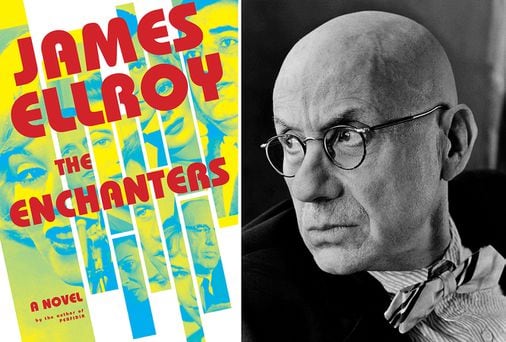
Self-doubt plagues many authors, but not James Ellroy. “The American hard-boiled novel begins with Dashiell Hammett’s ‘Red Harvest’ and concludes with my new novel, ‘The Enchanters,’” he says. Ellroy has plenty of evidence to point to. His many books, such as “LA Confidential” and “The Black Dahlia,” have landed on the bestseller list and been adapted into movies. In his newest, an unscrupulous private eye is hired to follow Marilyn Monroe, a job that leads through the bowels of Los Angeles and straight to the White House.
BOOKS: What are you reading?
ELLROY: I’m not reading anything. I tried reading “The Quiller Memorandum” and “The Ninth Directive,” a couple of novels by Elleston Trevor, who wrote under the pseudonym Adam Hall. I tossed them across the room, so I’m on hiatus right now.
BOOKS: What made you toss those books?
ELLROY: “The Quiller Memorandum,” which I recall as a half-decent movie with George Segal, seemed like it would be a straight-ahead spy book but it was practically a comic book. During my long life I’ve read almost exclusively crime novels, spy books, and detective novels. I have low standards for reading. If it’s competent, I can stay with it for a while. Not so with those two books.
BOOKS: What was your last best read?
ELLROY: I enjoy reading and rereading Hillary Waugh’s masterful police novels from 1959 to 1967. He churned them out very quickly. Writing genre books way back then didn’t pay very well. I’m always recommending the first of his police procedurals, “Last Seen Wearing,” which is about the disappearance of a college girl from a ritzy Massachusetts women’s college. It’s a jazzy book.
BOOKS: Are there any other American crime writers from that era you wish were better known?
ELLROY: Ed McBain, which is a pseudonym for Evan Hunter, who wrote “The Blackboard Jungle.” I enjoyed his “87th Precinct” mysteries a lot. I have all of them. The quality varies because he had to write too damn fast.
BOOKS: Are there crime writers you keep returning to?
ELLROY: I can go back to Dashiell Hammett and reread his books with pleasure. “Red Harvest,” his first book, is not as good as “The Maltese Falcon” and not as important, but I like it more.
BOOKS: Why?
ELLROY: It’s got a historical backdrop. It’s set during the Anaconda Copper Mine labor wars in Montana.
BOOKS: Do you prefer your fiction to be historical?
ELLROY: I don’t have a computer. I’ve never used cellphones. I don’t have text messaging. I live in the past. My imagination is embedded there.
BOOKS: Do you read any literary fiction?
ELLROY: Every time I have tried to read deep, dark, probing novels about contemporary America, I get bored real quick.
BOOKS: Did any of the classics you were taught in school speak to you?
ELLROY: Such as who?
BOOKS: For example, Dickens, or Nathaniel Hawthorne or maybe Melville?
ELLROY: I never read any of those. I was never assigned to read the Hawthorne or the white whale book. I would have put them down anyway. I was a bad student.
BOOKS: What crime books do you recommend regularly?
ELLROY: I only recommend my books. Why read anybody else? I’m not jiving you here. There’s me and nobody else.
BOOKS: Do you reread your own books?
ELLROY: I’ll look at particularly moving or jazzy parts and read those for cadence and admire them. Also, my books have been published by Alfred A. Knopf, and they make the most beautiful books in the world. I enjoy being surrounded by them.
BOOKS: How do you keep your books?
ELLROY: I have custom made shelves in the living room and front hallway that match the decor of my pad. I have the fiction in alphabetical order and the nonfiction in alphabetical order. All the books have dust jackets and plastic sleeves.
BOOKS: What books do you have in your nonfiction section?
ELLROY: True crime books, such as “Kidnap” by George Waller from 1961. It’s a story of the Charles Lindbergh baby’s kidnapping in 1932. I have a fine book about the Wylie-Hoffert murders in New York City in 1963, “The Victims” by Bernard Lefkowitz and Kenneth Gross, and other books of that ilk.
BOOKS: Do you read any contemporary crime novels?
ELLROY: Nah.
BOOKS: Why not?
ELLROY: Because the modern world doesn’t grab me.
